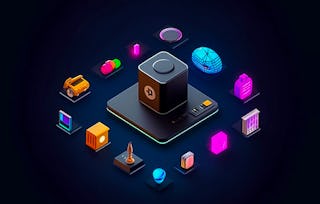The course aims to provide a solid foundation in blockchain technology, covering key concepts such as decentralized consensus, distributed ledgers, and immutability. Participants will grasp the fundamental principles that underpin Ethereum and other blockchain platforms.
● Participants will learn about the specific architecture and components of the Ethereum blockchain, including the Ethereum Virtual Machine (EVM), accounts, transactions, and smart contracts. They will gain an understanding of how these components work together to enable decentralized applications. ● The course will introduce participants to Solidity, the programming language used for developing smart contracts on the Ethereum platform. Participants will learn the syntax, features, and best practices of Solidity programming, enabling them to write secure and efficient smart contracts. ● Participants will learn how to develop, test, and deploy smart contracts on the Ethereum blockchain. They will gain hands-on experience in creating smart contract code, implementing functionalities, and testing their contracts using various tools and frameworks. ● The course will cover methods for interacting with the Ethereum network, including sending transactions, querying contract data, and utilizing Ethereum development tools and libraries. Participants will gain practical skills in interacting with the Ethereum blockchain programmatically.The course aims to provide a solid foundation in blockchain technology, covering key concepts such as decentralized consensus, distributed ledgers, and immutability. Participants will grasp the fundamental principles that underpin Ethereum and other blockchain platforms. ● Participants will learn about the specific architecture and components of the Ethereum blockchain, including the Ethereum Virtual Machine (EVM), accounts, transactions, and smart contracts. They will gain an understanding of how these components work together to enable decentralized applications. ● The course will introduce participants to Solidity, the programming language used for developing smart contracts on the Ethereum platform. Participants will learn the syntax, features, and best practices of Solidity programming, enabling them to write secure and efficient smart contracts. ● Participants will learn how to develop, test, and deploy smart contracts on the Ethereum blockchain. They will gain hands-on experience in creating smart contract code, implementing functionalities, and testing their contracts using various tools and frameworks. ● The course will cover methods for interacting with the Ethereum network, including sending transactions, querying contract data, and utilizing Ethereum development tools and libraries. Participants will gain practical skills in interacting with the Ethereum blockchain programmatically. Target audience: 1) Developers 2) Blockchain Enthusiasts 3) Entrepreneurs and Product Managers 4) Technical Professionals in the Finance and Banking industries 5) Students and Researchers Pre-requisites: 1) Participants should have a solid understanding of programming concepts and experience with at least one programming language such as JavaScript, Python, or Solidity. 2) Blockchain Basics 3) Web Development Skills 4) Command Line Experience: 5) Solidity and Ethereum Development Tools















